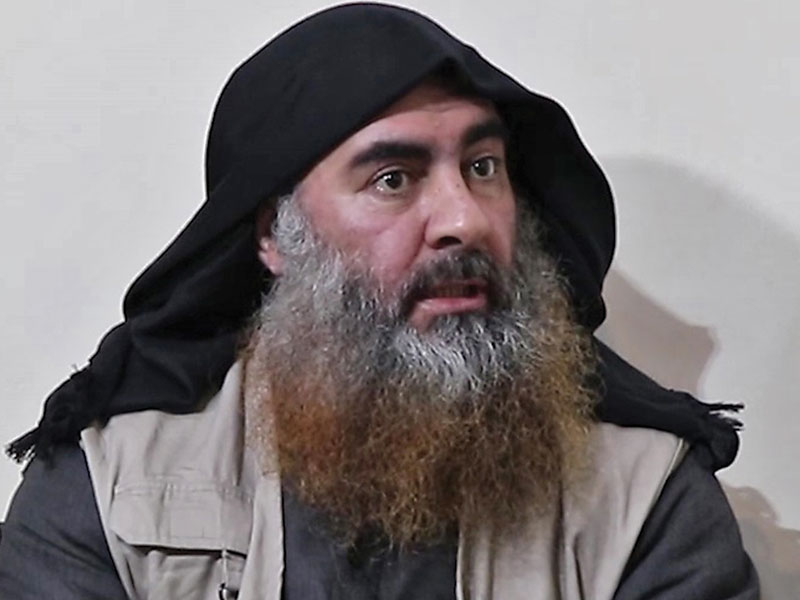Andrew Korybko
ONEWORLD GLOBAL THINKTANK
Daesh leader Al-Baghdadi was killed over the weekend during a US special forces raid in Syria's Idlib, which if true would represent a symbolic coup de grace against the world's most notorious terrorist group. There have already been several false alarms over the years alleging his death through various circumstances, but this time it seems more credible than all that others that he really did bite the dust like it's being reported. Should that be the case, then the US objectively deserves to be credited for killing him, notwithsanding the fact that they indirectly instrumentalized his organization by guiding it in the direction of their shared goals during the Hybrid War of Terror on Syria instead of sincerely fighting it the entire time like they publicly purported to be doing. Even so, Al-Baghadi's death really isn't that big of a deal since Daesh is more of a decentralized network nowadays than the conventional "Caliphate"-creating military force that it was during its heyday half a decade ago, which means that it should still be considered a serious threat all across Afro-Eurasia.
It was through the combined efforts of the Syrian Arab Army (SAA) and its anti-terrorist allies of Russia, Iran, and Hezbollah that Daesh was dealt its crushing conventional defeat, not due to the US-led coalition's bombing campaign that really only served to shepherd the group closer to Damascus in the year preceding Moscow's decisive anti-terrorist military intervention in the Arab Republic. The terrorists no longer control any sizeable amount of territory like they did in the past, which was made possible by the Russian Aerospace Forces bombing their state-of-the-art military assets and thus drastically reducing their capability to seize and hold territory like before. The on-the-ground counter-offensive by the SAA, the IRGC, and Hezbollah liberated the vast majority of the country, and they're the ones -- alongside their Russian partners -- who deserve credit for defeating this terrorist menace and thus saving the world from the dark consequences that would have transpired had the "Caliphate" been successfully created.
In the present day, Daesh is no longer the conventional threat that it used to be since it's reverted back into being a purely unconventional one by necessity that applies many of the tactics formerly employed by its rival Al Qaeda. The main difference between these two terrorist groups, however, is that Daesh's brief success in brutally carving out its self-professed "Caliphate" is incomparably more "inspirational" to future recruits and its targeted infowar audience in the international Muslim community ("Ummah") than the 9/11 terrorist attacks that Al Qaeda took credit for almost two decades ago. It's for this reason that the network spread across the Eastern Hemisphere from West Africa to Afghanistan through what some have described as a "franchise" model that led to it posing a very serious threat to stability in this broad trans-regional space across the central part of the Afro-Euraian landmass. Assassinating the largely symbolic leader of this organization therefore isn't going to have any noticeable impact on its activities outside of the immediate vicinity where he was hiding.
Unlike the much more hierarchical Al Qaeda, Daesh is mostly decentralized, thus making it even more dangerous because of how difficult it is to disrupt the vast network that its "franchisees" have formed between themselves. The ideal solution would be for the international community to pool its efforts into collectively thwarting the terrorists and ensuring that the so-called "Caliphate" never rises again anywhere in the world, but that's probably not going to happen given the tense rivalry between some of the world's Great Powers in the ongoing global systemic transition and its associated New Cold War, so the answer therefore lies in assembling more "coalitions of the willing" that conduct joint activities of a military, intelligence, and post-conflict socio-economic stabilizing nature with the authority of the internationally recognized governments in which the kinetic aspect of these campaigns will be waged.
For example, Russia's recent "Return to Africa" could see Moscow expanding its military footprint in both the conventional (advisors) and unconventional (private military corporations) sense upon the invitation of the many host countries that are still threatened by Daesh's "franchises", thus enabling the Eurasian Great Power to improve those states' "Democratic Security" capabilities and therefore avoid a repeat of the "Caliphate's" 2014 creation in "Syraq". The West African border triangle of Burkina Faso-Mali-Niger is the new "Syraq" in this respect and therefore might be the focus of Russia's anti-terrorist activities, conducted not in the dramatic conventional way that its intervention in Syria has been, but in a more subtle behind-the-scenes one that proceeds silently but nevertheless still successfully. However it plays out, it's important to realize that Daesh is still a problem despite Al-Baghdadi's reported assassination, but that Russia will likely continue to play a key role in fighting against it across the world, albeit in different forms depending on the nature of the threat.
* Daesh= ISIS= Jihadis= Takfiris
[premium_newsticker id="211406"]
Read it in your language • Lealo en su idioma • Lisez-le dans votre langue • Lies es in Deiner Sprache • Прочитайте это на вашем языке • 用你的语言阅读
[google-translator]
 Keep truth and free speech alive by supporting this site.
Keep truth and free speech alive by supporting this site.
Donate using the button below, or by scanning our QR code.
And…PLEASE!
THE DEEP STATE IS CLOSING IN
![]() The big social media —Google, Facebook, Instagram, Twitter—are trying to silence us.
The big social media —Google, Facebook, Instagram, Twitter—are trying to silence us.
Sign up with TGP so we can always reach you with our vital information. Don’t let the darkness win.

THIS WORK IS LICENSED UNDER A Creative Commons Attribution-NonCommercial 4.0 International License









